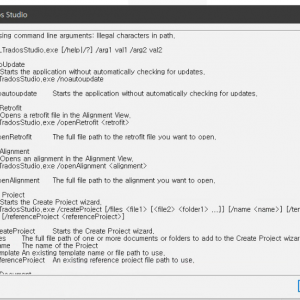
완료 시제(The perfect tense)
8a 지금까지 우리는 현재 시제 동사를 살펴보았습니다(예를 들어 rego ‘I rule’). 그러나 이것만으로는 충분하지 않습니다. 완료 시제를 살펴보겠습니다.
8b rego를 예로 들어보겠습니다. 지금까지 우리는 일인칭 현재형 rego ‘I rule’ 및 부정사 regere ‘to rule’를 학습하였습니다. 이제 완료형을 학습합니다. 활용 예: rex-i ‘I ruled’
분석: rex-는 완료형 어간입니다. 어미 -i는 일인칭 어미입니다. rexi의 의미는 ‘I ruled’ 또는 ‘I have ruled’ 또는 ‘I did rule’입니다. 아래에 rexi의 활용을 정리하였습니다.
1s rex-I ‘I (have) ruled, did rule’
2s rex-isti ‘you (s) (have)’ ruled, did rule
3s rex-it ‘he/she/it (has) ruled, did rule’
1pl rex-imus ‘we (have) ruled, did rule’
2pl rex-istis ‘you (pl) (have) ruled, did rule’
3pl rex-erunt ‘they (have) ruled, did rule’
각 인칭의 동사 어미를 관찰하십시오: -i, -isti, -it, -imus, -istis, -erunt.
현재형 인칭 어미인 -t (3s), -mus (1pl), -tis (2pl) and -nt (3pl)를 환기해 보십시오. 위의 완료형 인칭 어미들은 제1형부터 제5형까지의 활용 동사 전부에 그대로 적용됩니다. 라틴어는 규칙적인 언어입니다.
8c 보시다시피 동사의 완료형 어간은 현재형 어간과 다릅니다. 현재형의 reg-는 완료형에서 rex-로 변합니다. 현재형 어간에 -s-i-이 더해져 완료형 어간이 만들어집니다(reg-s-I = rexi-). 제3형 곡용 명사에서처럼 어간의 변화는 난폭(?)하다시피 하여 예측이 불가능합니다. 유감스럽지만 익혀 두어야 합니다.
8d 다음의 완료형을 노트해 두십시오. 일인칭 현재형과 부정사형을 함께 보여드립니다.
apprehend-o apprehend-ere apprehend-i ‘ seized’, cap-io cap-ere cep-i ‘I caught’, dic-o dic-ere dix-i ‘I said, duc-o duc-ere dux-i ‘I led’, fac-io fac-ere fec-i ‘I did, made’, iube-o iube-re iuss-i ‘I ordered’, mitt-o mitt-ere mis-i ‘I sent’, senti-o senti-re sens-i ‘I felt’, veni-o veni-re ven-i ‘I came’, vide-o vide-re vid-i ‘I saw’, vinc-o vinc-ere vic-i ‘I conquered’.
sum, esse fu-i ‘I was, I have been’. possum posse potu-i ‘I could, was able, have been able’.
연습 문제
- 다음 동사를 완료형(3인칭 단수 및 복수)으로 바꾸시오. capio, dico, duco, sum, mitto, facio, video, venio.
- 다음 현재형 동사를 그에 상응하는 완료형으로 바꾸시오. 예 dicis (“you say’) → dixisti (‘you said’). 물론 이렇게 하려면 완료형 어간을 알아야합니다.
apprehenditis, capit, sunt, dicimus, possunt, ducunt, facis, est, iubes, mitto, sentimus, veniunt, vides, sumus, vincitis.
- 다음을 라틴어로 번역하시오. he came, he saw, he conquered; we have caught; she was; you (s) felt; they ordered; she has sent; you (s) led; they were able; I seized; you (pl) have been; we made.
해답
1. cepit ceperunt, dixit dixerunt, duxit duxerunt, fuit, fuerunt, misit miserunt, fecit fecerunt, vidit viderunt, venit venerunt.
2. apprehendistis, cepit, fuerunt, diximus, potuerunt, duxerunt, fecisti, fuit, iussisti, misi, sensimus, venerunt, vidisti, fuimus, vicistis.
3. venit, vidit, vicit; cepimus; fuit; sensisti; iusserunt; misit; duxisti; potuerunt; apprehendi; fuistis; fecimus.
좋은 소식은 좀 어려운 부분을 먼저 학습한 것입니다. 위에서 본 동사의 대부분은 제3, 5형 활용 동사이며 이들의 완료형 어간은 항상 예측불가능이라 익혀 둘 수밖에 없습니다. 이들 동사는 매우 널리 쓰이고 있습니다.
그러나 대부분의 제1, 2, 4형 활용 동사는 규칙적으로 변하며 제12장에서 학습합니다. 그동안 제3, 5형 활용 동사의 완료형 어간을 잘 익혀두시기 바랍니다.
8e 다음을 영어로 번역하시오. hic Willelm dux iussit milites naves (a)edificare (aedifico 1v build); hic trahunt naves ad mare (sea); hic milites portant armas (guess!) ad naves, et hic trahunt carrum (cart) cum vino et armis; hic milites venerunt ad proelium contra Haroldum regem.
해답
Here Duke William ordered soldiers to build ships; here they drag ships to the sea; here soldiers carry weapons to the ships, and here they drag a cart with wine and weapons; here soldiers came to battle against Harold the king.

호격(Vocatives)
8f 호격(vocative case)은 누구를 부를 때 사용됩니다. 예.’Trevor, bend over’, ‘Donald, what are you doing?’
호격은 주격과 동일한 형태입니다.
중요한 예외: 제2형 곡용 명사 중 servus는 단수 호격의 어미가 -e입니다. 예, ‘o slave’의 호격 o serve(그러나 복수의 경우는 규칙을 따릅니다. 예, ‘o slaves’의 호격은 o servi로서 주격과 동형입니다.). 또 다른 예를 들면 Christus의 호격은 Christe(그리스도님), Brutus의 호격은 Brute (et tu Brute!-브루투스 너도!)
연습 문제
다음을 영어로 번역하시오. Angle, quid fecisti?; ave et vale; Harolde, noli venire contra militem; post prandium equitare non potui, Willelme dux; milites, date prandium; noli me tangere (touch); dic, dux; fac, rex; audite, servi; salvete, angeli.
해답
Englishman, what did you do?; hail and farewell; Harold, do not come against the soldier; after lunch I could not ride, Duke William; soldiers, give lunch; do not touch me; speak, leader; do, king; listen, slaves; welcome, angels.
Carmina Burana (서기 13세기)
8g 다음 단어를 노트해 두십시오(아래 시구의 순서). tempus time; iocundum joyful; modo now; congaude-o rejoice together; vos you; iuven-is young man; totus all over; flore-o I flower, flourish; iam now; amore virginali with pure love; arde-o I burn; novus fresh, new; quo by which; pere-o I perish; domicella darling; gaudi-um joy; pulchra my beauty.
tempus est iocundum
o virgines,
modo congaudete,
vos iuvenes.
o, o,
totus floreo,
iam amore virginali
totus ardeo,
novus, novus amor
est, quo pereo.
veni, domicella,
cum gaudio,
veni, veni, pulchra,
iam pereo.
해답
The time is joyful,
young girls,
now rejoice together,
you young men.
O, o, I flower all over,
now with pure love
all over I burn,
new, new is the love
of which I die.
Come, darling,
with joy,
come come, (my) beauty,
now I die.
아직 학습하지 못한 명사 등의 변화가 보이지만 지금은 그냥 그대로 익혀 두십시오.
여러분 수고하셨습니다.








